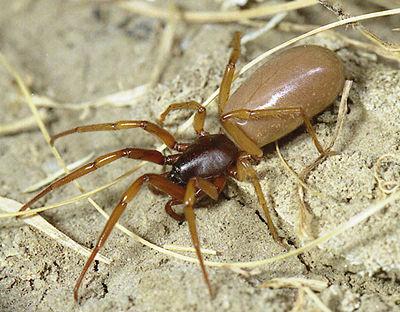Taxonomic status of Harpactea rubicunda:
Regnum: Animalia
Phylum: Arthropoda
Classis: Arachnida
Ordo: Araneae
Family: Dysderidae
Area
A Harpactea rubicunda lives in Eurasia. Most of the data known from Germany, however it have been found in almost a every contry of Central-Europe. In west-Russia also can be found this tiny spider. The most Easter locality situated in Georgia. This species likes warm, rocky places. This nocturnal spider also can be found in humman settlements.
Feeding
As it is also known about all the spiders this species is predator too. It use to ambush and catch the prey with the long forelegs, when it comes close. This species has slim, fragile body which also helps hunting. Despite of the size this tiny spider also hunts for smaller spiders. Harpactea rubicunda feed with insects and other arthropodes.
Breeding
Theirs mateing is the so called Traumatic insemination, or also known as hypodermic insemination, in which the male pierces the female's abdomen with his penis and injects his sperm through the wound into her abdominal cavity. This type of mateing has been discovered very recently thus not all of the details are known.
Appearance
Harpactea rubicunda isn’t a big spider, adult size could be max. 12 mm. Females are larger than males. While most of the spiders has 8 eyes, Harpactea rubicunda as all the species belongs to Dysderidae Family has only 6. The adult’s praesoma is brown or black, youngs has yellowish praesoma. Adults has yellow legs, and the abdomen usually yellowish-brown or light-pink.
http://wiki.spinnen-forum.de/index.php?title=Harpactea_rubicunda
http://wiki.spinnen-forum.de/index.php?title=Datei:Rubicunda_2002.jpg
http://en.wikipedia.org/wiki/Harpactea
http://en.wikipedia.org/wiki/Dysderidae
http://www.essexfieldclub.org.uk/portal/p/Picture/r/view/s/Harpactea%20rubicunda
